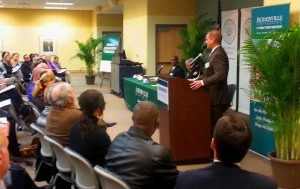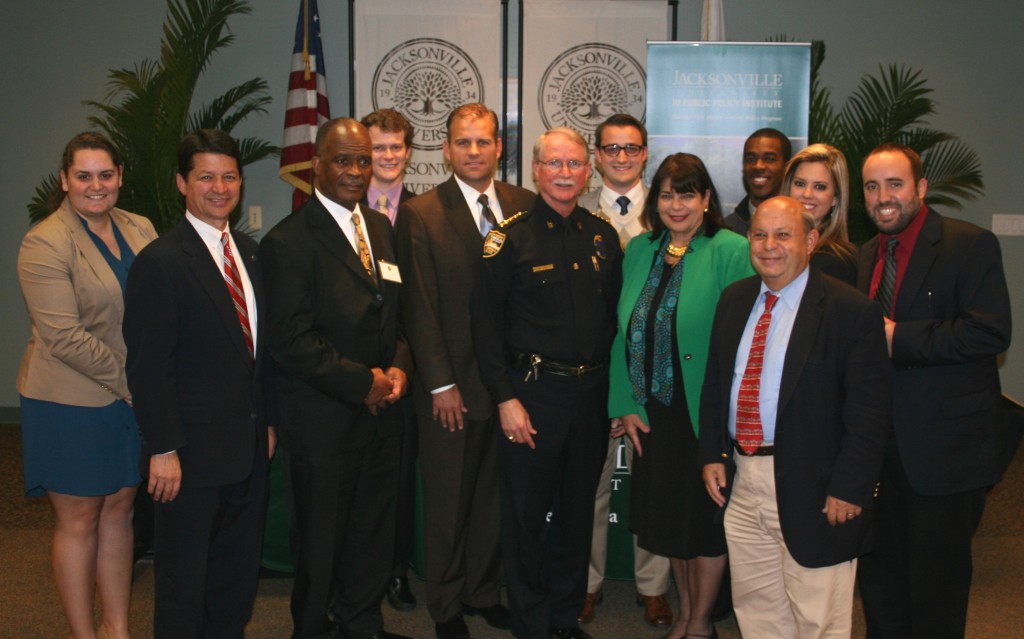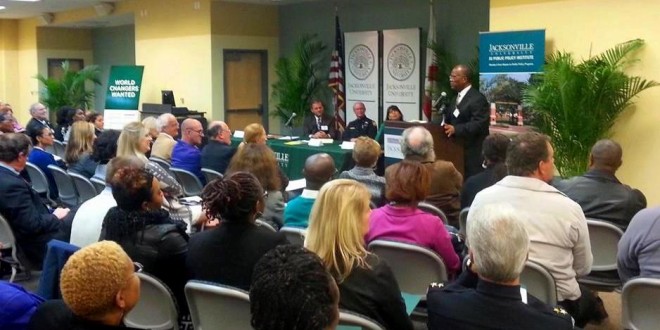Socioeconomics, family dynamics, race and legal maneuvering were all on the table Thursday, Nov. 20, as some of the top – and most topical – names in the regional legal system gathered for a spirited Juvenile Justice Forum hosted by the Jacksonville University Public Policy Institute.
In perhaps the most pointed remarks of the evening, Circuit Court Judge Henry E. Davis told the audience of nearly 200 that more emphasis must be placed on “our children who have not yet been conceived,” to reduce the sheer numbers of youths caught up in the legal system.

“Once a child is conceived under certain circumstances, your plot is cast,” he said. “There are serious barriers for them.”
Davis noted that race cannot be ignored when discussing juvenile justice, pointing out that the lingering effects of slavery on black people still plays a role.
“Some days, every child on my docket is black – just today, 15 out of 18 were,” he said. “They didn’t ask for their circumstances. If I had the parents that some of these kids had, I’d be dead myself … Whereas you and I, we all won the birth lottery: we were born to two healthy, intelligent parents.”
 The free public event in the Davis College of Business included a Q&A session and also featured Angela Corey, state attorney for the 4th Judicial Circuit; Jacksonville Sheriff John Rutherford; and Public Defender Matt Shirk. JU PPI Director Rick Mullaney, who moderated the evening, applauded those attending for showing “we can have a neutral gathering place to discuss significant public policy matters facing our city, state and nation.”
The free public event in the Davis College of Business included a Q&A session and also featured Angela Corey, state attorney for the 4th Judicial Circuit; Jacksonville Sheriff John Rutherford; and Public Defender Matt Shirk. JU PPI Director Rick Mullaney, who moderated the evening, applauded those attending for showing “we can have a neutral gathering place to discuss significant public policy matters facing our city, state and nation.”
JU President Tim Cost, meanwhile, spotlighted the Institute and the University as focal points for ideas, innovation and discussion.
“Intellectually we should all be able to talk about tough, controversial topics,” he said. “The public will always be welcome here to partake in the process.”
Rutherford and Shirk argued about the merits of civil citations for first-time offenders, with Shirk saying they weren’t used enough and that police officers should have more discretion to cite juveniles for “public affray” – fighting that causes a disturbance – rather than arrest them on the more serious charge of battery.
Rutherford, however, countered that such citations sometimes do not help youths “understand there are consequences to their actions, because in many of their homes, they aren’t always being taught about that.”

He noted that Duval County’s 73 percent divorce rate does not help the situation, and that the topic of single-parent homes isn’t discussed enough.
“No one wants to talk about single-parent families … which aren’t always the best way to raise a child,” he said. “And we don’t discuss values, because that means talking about faith, and talking about faith means talking about God, and no one wants to do that. Well, I am.”
Shirk also said he saw problems with a “flawed system” that has created a high use of direct filing in the circuit – in which Florida prosecutors can charge a juvenile in adult court without a judge’s oversight. While direct filing is actually down 50 percent since 2008, “there are issues with making a juvenile an adult when one person is making that decision,” he said.

However, Corey defended her office’s use of direct filing when needed to ensure the safety of the public, adding that the numbers are not as high as people have been led to believe.
“We will continue to use it when appropriate,” she said. “We will not sacrifice victims’ rights just for the sake of trying to match statistics elsewhere in the state.”
Corey also said Shirk and his office had put out incorrect information about how many non-arrest “diversions” her office does.
“With all due respect, Matt, we do a lot more non-arrest diverts than you hear about. Your statistics are wrong.”
The testy exchange included Shirk pointedly asking Corey to explain what statistics she was referring to, as Mullaney moved the discussion to other topics.
Asked for solutions during the panel dialogue, Davis interjected that among other things, residents should create change at the individual level.
“We all need to go out and identify one child who needs help, and what type of help, and then pretty soon you’ll start a movement,” he said. “These kids, for example, sometimes need money – not just a pat on the head and a ‘Jesus loves you.’ ”
Thursday’s event wrapped up a busy fall schedule for the JU PPI, during which free public events also included a joint appearance by U.S. Reps. Corrine Brown and Ander Crenshaw to discuss national policy; a Children’s Health Symposium in partnership with the City of Jacksonville for elected officials and health industry leaders; an annual Hesburgh Lecture co-sponsored by the Notre Dame Club of Greater Jacksonville featuring Notre Dame economist Dr. Thomas Gresik on energy policy; and an Education Policy Conference that included State Board of Education Chair Gary Chartrand, State Education Commissioner Pam Stewart and Duval Schools Superintendent Nikolai Vitti.
For more information on the JU Public Policy Institute and its degrees and programs, visit http://www.ju.edu/ppi.
 Wave Magazine Online Jacksonville University News Hub
Wave Magazine Online Jacksonville University News Hub
